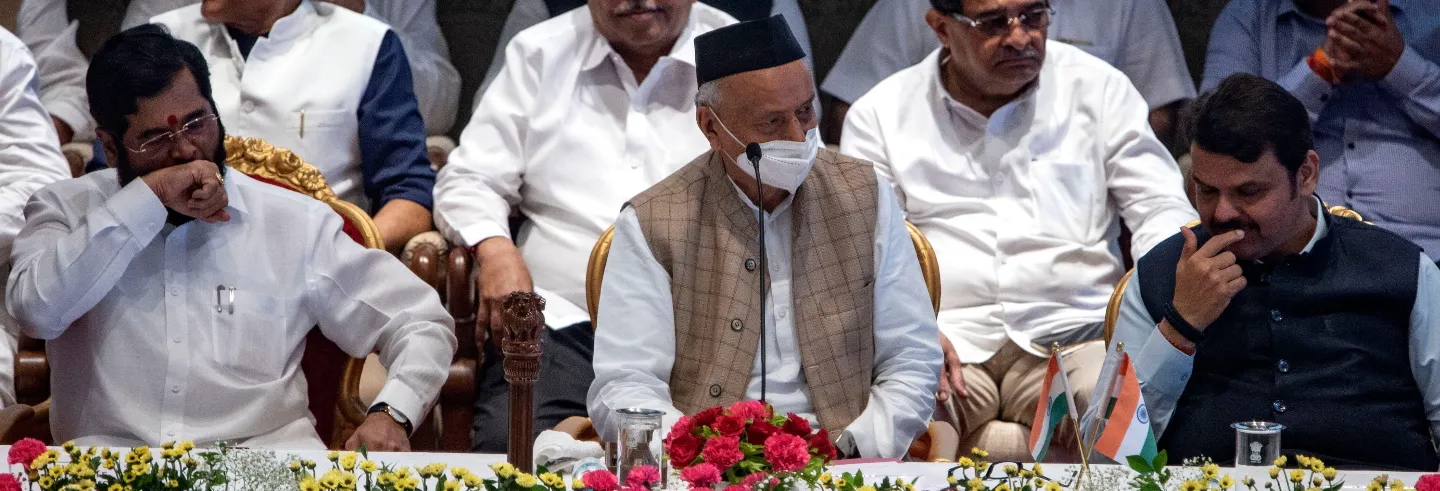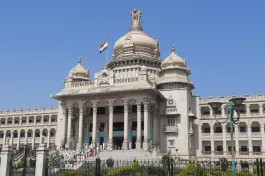A part of the Constitution of India goes against its very spirit. It is the Tenth Schedule, that was added by the 52nd Amendment. Passed by Parliament in 1985 to prevent political defections, it is commonly referred to as the anti-defection law. It was meant to prevent legislators elected on one political party’s ticket from shifting their allegiance to another. Its purpose was to bring about political stability.
Since then, it has stifled the voices of our elected representatives, severely damaged constitutional offices, and made a mockery of our democracy. The anti-defection law has failed to ensure stable governments for 37 years.
Some recent examples could be cited. No political party secured a clear majority after the 2018 assembly election in Karnataka. B.S. Yediyurappa of Bhartiya Janata Party (BJP) became the chief minister for three days and resigned as he could not prove his majority. After that, H.D. Kumaraswamy of Janata Dal (United) [JD (U)]-Congress alliance became the chief minister for 13 months. He had to resign after defections and resignations led to his government losing a trust vote in the legislative assembly. It resulted in Yediyurappa returning to the driver’s seat for two years.
Madhya Pradesh also went to the polls in 2018. After this election, Kamal Nath of Congress formed a government with the support of independents and other parties. Resignations by Congress members of the legislative assembly (MLAs) brought down his government in about 13 months.
In Maharashtra, after the 2019 state election, the BJP’s Devendra Fadnavis became the chief minister for three days. Unable to secure a majority, he resigned, and a coalition of Shiv Sena, Nationalist Congress Party, and Congress formed a government led by the Sena’s Uddhav Thackeray. But a rebellion in the party led to his resignation earlier this year.
[T]he law’s applicability is less about providing stability to governments and more about strengthening the hands of the political party leadership in dealing with dissenting legislators.
Even with these failures, there are calls to strengthen the anti-defection law instead of abandoning it. The fundamental question is whether it is legally possible to prevent a party’s legislators shifting their loyalty to another.
The phenomenon of legislators defecting from one party to another has an interesting history in India. Between the first general election in 1951 and the fourth in 1967, 542 MLAs changed their political allegiance. In the 12 months between February 1967 and March 1968 alone there were 438 defections.
These numbers are from the first paragraph of the report of the 1968 Y.B. Chavan Committee, which had been set up following a resolution passed in Lok Sabha. A dissent note by Communist Party of India (CPI) leader Bhupesh Gupta gives some context to these numbers. Gupta stated that the defections till 1967 favoured the Congress party, which dominated the national and the state legislatures. After the fourth general election, Congress suffered electoral losses and, as a result, MLAs were not only defecting and joining it but also deserting its ranks.
The report stated that in addition to money, “the lure of office played a dominant part in decisions of legislators to defect.” It pointed out that after the 1967 election, out of 210 defecting legislators in seven states, 116 became ministers in governments that they helped form by their defection.
The framers of our Constitution adopted the Westminster model for independent India. Under this system, the government is accountable to a popularly elected legislature. Therefore, a political party can form a government and stay in power if it has a majority in the legislature. This presents a challenge to a political party in two ways. First, it has to win enough seats on its own or build a coalition with other parties to form a government. It can also garner the support from individuals who have won the election on their own (independents) to back its government. The second part of the challenge comes after forming the government. The ruling party or coalition has to keep its legislators together so that its government does not lose its numerical advantage in the legislature.
Enactment of the anti-defection law
After the electoral churn of 1967, political parties agreed that there was a need to reign in their legislators. Desertions and indiscipline in their ranks led to the fall of several governments across the political spectrum. In the 1970s, Congress and later Janata Party attempted to bring a law preventing defections. But the 1985 Congress government, with its 400 members in Lok Sabha (MPs), was able to amend the Constitution and provide a quick legal solution to the political problems faced by parties.
The law did four things:
1) It defined what would constitute defections;
2) It laid out the requirements for legislators to defect in groups;
3) It specified the authority for deciding on cases for defections; and
4) It punished legislators for defecting by taking away their seat in the legislature.
According to the law, if a legislator who has won an election on a political party ticket “voluntarily” gives up his or her party membership or votes against the organisation’s wishes in the legislature, the party can proceed against the member under the anti-defection law.
Individuals who win an election independently will come under the purview of the law if they join a political party afterwards. For example, in 2021, Jignesh Mevani, an independent MLA from Gujarat, would have attracted this provision had he formally associated himself with Congress. At that time, he declared that he had joined the political party only in “spirit.”
[A]ny legislator who disagrees with his or her party leadership or its stand on a particular issue can face disqualification proceedings.
The law allows nominated legislators to become part of a political party within six months. If they do so after six months, they also come under the anti-defection law. Last year, nominated Rajya Sabha MP Swapan Dasgupta filed his nomination papers for contesting the West Bengal legislative assembly elections as a BJP candidate. He had to resign his seat in the Rajya Sabha when Trinamool Congress MP Mahua Moitra complained that he would be violating the anti-defection law.
When Parliament made this law, it provided two ways in which a group of legislators could defect without attracting a penalty under the law. The first was that if one-third of the legislators of a political party split from it, and, the second, if two-thirds of a party’s legislators merged with another party. In either case, it would not be considered a defection. For example, eight of the 11 Goa Congress MLAs “merged” the Goa Congress Legislature Party with BJP in mid-September.
The law specifies that the presiding officers of legislatures will decide on cases of defections. If they find that a legislator or a group has violated the law, the guilty would lose their seats in the legislature. The constitutional amendment bill’s stated purpose was, “The evil of political defections has been a matter of national concern. If it is not combated, it is likely to undermine the very foundations of our democracy and the principles which sustain it.”
But the framing of the anti-defection law raises doubts about its noble intention. Let us begin with how the law defines defection.
Failings of the law
According to the provisions of the anti-defection law, if legislators voluntarily give up their membership of a party, they can be accused of defecting from it. The law leaves this phrasing ambiguous without defining it. As a result, any legislator who disagrees with his or her party leadership or its stand on a particular issue can face disqualification proceedings. Courts have interpreted this provision liberally. Thus, the law covers a legislator’s actions inside and outside the legislature.
This state of affairs gives political parties immense power to stamp out internal dissent by threatening its MPs and MLAs with disqualification from the legislature. Lawmakers who do not see eye to eye with the party’s leadership risk losing their seat in the legislature for voicing their opinion. This chokes the voices of our elected representatives on critical issues as they would rather not risk losing their seats for disagreeing with their party’s leadership.
It raises the question of whether our representatives are responsible only to their political organisation. Or do they also have some responsibility for voicing the opinion of the people who elected them?
[The anti-defection law] gives political parties immense power to stamp out internal dissent by threatening its MPs and MLAs with disqualification from the legislature.
Legislators disagreeing with their political party will not always destabilise a government. For example, if an opposition MLA disagrees with his or her political party, it will not impact the government. Similarly, Rajya Sabha MPs and Members of Legislative Councils in states have no role in forming a government or its continuance. But the anti-defection law is applicable to them as well. This makes it clear that the law’s applicability is less about providing stability to governments and more about strengthening the hands of the political party leadership in dealing with dissenting legislators.
During the making of the anti-defection law, the then government had justified the exception for one-third splits and two-thirds mergers as providing dissent mechanisms for protecting legislators who banded against their political party. But in the first 15 years of the law, it became evident that political parties were using the one-third split provision to break their rivals and engineer wholesale defections. Its most successful use was in Goa, where between 1990 and 2000, there were seven different chief ministers, some serving multiple times and only two completing more than two years in office.
Attempts at reform
The Law Commission of India, in its 170th report on Electoral Reforms submitted in 1999, had recommended the deletion of both the split and merger provisions. Acting on the commission’s report, Parliament deleted the split clause in 2003 by passing the Ninety-first Amendment to the Constitution. This amendment's statement of objects and reasons admitted that the anti-defection law “has also been criticised on the ground that it allows bulk defections while declaring individual defections as illegal. The provisions for exemption from disqualification in case of splits as provided in paragraph 3 of the Tenth Schedule to the Constitution of India has, in particular, come under severe criticism on account of its destabilising effect on the Government.”
During the debate on this constitutional amendment, two Rajya Sabha MPs also urged deleting the merger provision. Telugu Desam MP Ravula Chandra Sekar Reddy stated, “Let this legislation be extended and made applicable to mergers as well since, in my opinion, merger is a hiatus and a respectable name for defection. They would have fought the election on a particular plan and manifesto. By merging the parties, they will be defeating the mandate of the people. If you want to cleanse politics, we should prohibit this type of mergers also.”
Legislators disagreeing with their political party will not always destabilise a government.
As mentioned, the law commission had also championed the merger provision’s deletion. It had observed the clause would lead to “several complications and unnecessary disputes.” Its prediction has been proved correct in the tussle between the Uddhav Thackeray and the Eknath Shinde factions. The Shinde faction has two-thirds of the Shiv Sena MLAs with them and wants to be recognised as the real Shiv Sena. The contention of the Thackeray camp is that the rank and file of the party is with them and therefore the two-thirds merger provision is not applicable in this case. The last Chief Justice of India, N.V. Ramana, in August of 2022 referred the matter regarding the interpretation of different aspects of the anti-defection law to a constitution bench of the Supreme Court.
Speaker’s role
The anti-defection law has also brought the non-partisan constitutional office of the speakers of legislatures into disrepute. The law makes the speakers the deciding authority in defection proceedings. The thinking was that giving such responsibility to the speaker would speed up the adjudication process. During the debate on the law, some MPs pointed out that involving speakers in defection proceedings would drag their office into unnecessary controversies.
Speakers usually belong to a ruling party or coalition. Over the years, their actions in defection proceedings have strengthened the belief that they act as party members rather than impartial adjudicators. For example, roughly two years after the passing of the anti-defection law, there was a struggle in the ruling All India Anna Dravida Munnetra Kazhagam (AIADMK) for the control of the party. It took place after the death of Tamil Nadu Chief Minister M.G. Ramachandran in 1987. The speaker belonged to one faction of the party and instantly disqualified 27 rival MLAs during a confidence vote on the legislature’s floor.
The conduct of speakers has also come under criticism from courts when they have inordinately delayed defection proceedings. In the last Andhra Pradesh and Telangana legislative assembly, the speakers did not decide defection proceedings till the expiry of the term of the legislature. In 2017, a Manipur MLA elected on a Congress ticket became a minister in the BJP government. The speaker delayed the defection proceedings against the MLA for more than three years. It was the apex court’s intervention that led to the disqualification of the MLA. The court recommended that speakers must decide on cases of defection within three months.
A bench comprising Justices R.F. Nariman and S. Ravindra Bhat urged that “Parliament may seriously consider amending the Constitution to substitute the Speaker of the Lok Sabha and Legislative Assemblies as arbiter of disputes concerning disqualification which arise under the Tenth Schedule with a permanent Tribunal headed by a retired Supreme Court Judge or a retired Chief Justice of a High Court, or some other outside independent mechanism, to ensure that such disputes are decided both swiftly and impartially, thus giving real teeth to the provisions contained in the Tenth Schedule, which are so vital in the proper functioning of our democracy.”
The Dinesh Goswami Committee on Electoral Reforms in 1990 also recommended divesting speakers of the responsibility of deciding on defections. The National Commission to Review the Working of the Constitution (NCRWC) made a similar suggestion. The frequent battles over government formation or saving a government using the anti-defection law have subverted the speaker's office. Therefore, there is no guarantee that other constitutional offices would not get compromised deciding these political questions.
Over the years, [the speakers’] actions in defection proceedings have strengthened the belief that they act as party members rather than impartial adjudicators.
Another suggestion that is often made to tighten the anti-defection law is to not count the vote cast by a defector legislator while deciding the fate of a government. This was a suggestion that was made by the NCRWC. It is an idea that Pakistan is also considering. Earlier this year, the president of Pakistan referred four questions related to defections to the country’s supreme court for its opinion. One of them is not counting the votes of defecting legislators. The provisions clamping down on defections in Pakistan differ from ours. Article 63A of the Pakistani Constitution restricts the scope of defection to two areas. First, it becomes applicable when a legislator resigns from a political party. The second is when legislators vote contrary to their party’s wishes on a vote of confidence or the budget. Defection cases in Pakistan are decided by the leadership of a political party. The Pakistan Supreme Court has held that the votes of a defecting legislator should not be counted while deciding the fate of a government.
But this solution is also problematic. In our constitutional scheme of things, a government can be thrown out, if the opposition can rally a majority of legislators to vote against the government. If the votes of a dissenting legislator are not counted during a no confidence motion, it would mean that every government, whether it enjoys the confidence of the legislature or not, will artificially stay in power for the full five years.
So, in India the recommendations over the years to tighten the anti-defection law are to prohibit both individual and group defections; to entrust an independent authority to decide defection cases promptly; and to not count the votes of defecting legislators trying to topple a government. All these recommendations are worth considering if they guarantee stable governments. Yet, our experience with political parties has been that they are adept at bypassing laws. For example, stringent laws prevent convicted individuals from fighting elections. But political parties simply replace them with other individuals who can win elections even though they have criminal antecedents, as long as they can contest elections.
[D]efections are a political problem that need to be dealt by political parties; it is not a legal lacuna that needs to be addressed.
Similarly, there is more than one way to topple a government. For example, in Karnataka and Madhya Pradesh, legislators were able to topple the government by not defecting but by resigning their legislative seats and reducing the number supporting the government. They then contested elections on the ticket of the party that benefitted from their resignation and joined it. In such cases, there is not much a stringent anti-defection law can do.
Conclusions
This essay began with asking the question if it is legally possible to stop elected representatives from defecting to another party. The 1968 Chavan committee on defections did not think so. Eminent constitutional experts on this committee like M.C. Setalvad, C.K. Daphtary in their report to the main committee stated that: “While the search for legal and constitutional curbs on political defections has undoubtedly its value, the more lasting solution to the problem can only come from the adherence of political parties to a basic political morality and the observance by them of certain proprietaries and decencies of public life.” Their observations stem from the fact that defections are a political problem that need to be dealt by political parties; it is not a legal lacuna that needs to be addressed.
Take the United States and the United Kingdom, which do not have an anti-defection law. In both these countries, legislators regularly vote against their party line. The difference is that in these democracies, parties use inner-party deliberative and dissuading mechanisms to reign in their members. For example, 10 Republican congressmen and seven senators voted with their Democratic colleagues in support of impeaching US President Donald Trump. No party whip could force them to vote to support the president. One of them was Congresswomen Liz Cheney. Since she defied the party line, her party removed her from her leadership position in the House of Representatives. Earlier this year, Trump endorsed a rival candidate to oppose her re-election.
In India, the question of legislators not adhering to party discipline is a political issue, one between them and their political party. If political parties want to have members who toe the party line, their leadership must work harder to promote internal party democracy, dialogue, and avenues for growth of its members. The real question would be why the Constitution should come to the rescue of political parties that cannot keep their members together. This question becomes critically important because the anti-defection law continues to compromise the effective functioning of our legislatures.
Chakshu Roy heads the legislative and civic engagement initiatives at PRS Legislative Research. He anchors programmes to strengthen the capacity of legislators at the centre and state-level, and has trained journalist groups about tracking the functioning of the parliament and state assemblies.









